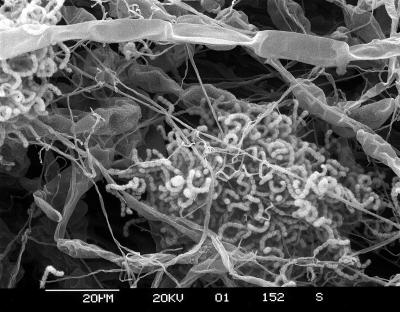Soil microbes could promote better farm outputs

Credit: CSIRO
In hotter, dryer conditions with climate change, a secret agent for more sustainable agricultural production could lie in harvesting the diverse beneficial soil microbiome in native bushland settings, scientists say.
New research from CSIRO, Flinders University and La Trobe University highlights the importance of soil biological health and further potential to use organic rather than chemical farm inputs for crop production.
“We know antibiotics are very useful in pharmaceuticals, and actinobacteria found plentifully and in balance in various natural environments play a vital role in the plant world,” says lead author Dr Ricardo Araujo, a visiting Flinders University researcher from the University of Porto in Portugal.
“These actinobacterial communities contribute to global carbon cycling by helping to decompose soil nutrients, increase plant productivity, regulate climate support ecosystems – and are found in abundance in warm, dry soil conditions common in Australia.”
A new article in Soil Biology and Biochemistry is one of the first dedicated studies of Australian actino-bacterial diversity in different areas of the Southern Hemisphere – using the bacterial gene sequence dataset generated through the ‘Biomes of Australian Soil Environments’ project with soil samples from across the nation, including mainland, the island state of Tasmania as well as King Island, Christmas Island and the Northern Antarctica for comparative soil profiles.
Other researchers from the La Trobe University AgriBio Centre contributed to the analysis of 2211 actinobacterial operational taxonomic units (OTUs) mapped in mainland Australia, and 490 OTUs from Tasmania, King Island, Christmas Island and Northern Antarctica.
CSIRO Agriculture and Food senior principal research scientist, Associate Professor Gupta Vadakattu, says the dfferences we found between mainland Australia and more remote locations showed how agriculture has had an impact on the diversity of actinobacterial.
“Our study shows how native vegetation is a reservoir for these important soil microorganisms, and this could be used to enrich adjoining agricultural soils,” says Associate Professor Vadakattu, adding an intriguing finding was the similarity in actinobacteria profiles of King Island and areas of Antarctica where these continents were once connected.
“Patterns of actinobacteria dispersal suggest only a small fraction of them had the capability of spreading throughout the Southern Hemisphere, especially across oceans.”
Flinders University colleague Professor Chris Franco, says biotechnology has long benefited from actinobacteria for human and animal health products, and increasingly in sustainable agriculture.
“The diversity and structure of soil antinobacterial communities are influenced by multiple factors, representing one of the most abundant soil bacterial taxa across a diverse range of ecological regions – from deserts to Antarctica,” Professor Franco says.
“There is much more we need to learn about their potential in primary production and retaining and incorporating native plants in our ecosystems.”
###
The new article, ‘ Biogeography and emerging significance of Actinobacteria in Australia and Northern Antarctica soils’ (August 2020) by R Araujo, VVSR Gupta, F Reith, A Bissett, P Mele, CMM Franco has been published in Soil Biology and Biochemistry (Elsevier) DOI: 10.1016/j.soilbio.2020.107805
Media Contact
Professor Chris Franco
[email protected]
Related Journal Article
http://dx.



